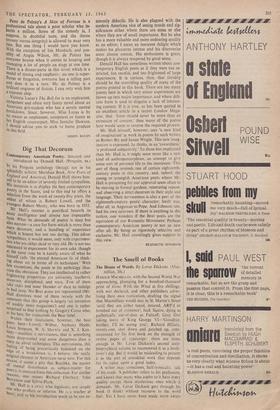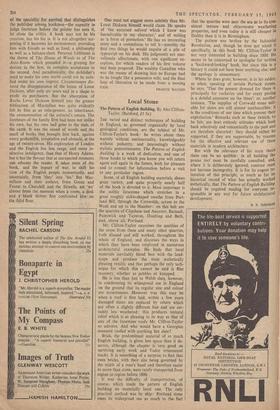The Smell of Books
..HAROLD MACMILLAN, with the Second World War approaching, plumping for a hundred-thousand print of Gone With the Wind at five shillings; with war declared, and other publishers adver tising their own rustication, drafting the signal that Macmillans would stay in St. Martin's Street 'until they are either taxed, insured, ARP'd or bombed out of existence'; Jack Squire, dying as pathetically out-of-date as Falstaff; Grey Owl taking leave of King George VI—`Goodbye,
brother, be seeing you'; Richard Hillary, twenty-one, shot down and patched up, com- missioned for his first book, on the strength of twelve pages of typescript: there are items enough in Mr. Lovat Dickson's second auto- biographical volume to recommend it as a book- lover's dip. But it would be misleading to present it as the sort of anecdotal work that depends for its ,value upon a good index.
A writer may sometimes, half-ironically, talk of his trade. A publisher refers to his profession, and knows that many who aspire to it have every quality except those mysterious ones which it demands. Mr. Lovat Dickson gets through his book (I think) without recourse to the word flair. Yet- have never been made more aware of the speciality for survival that distinguishes the publisher among bookmen—the capacity to judge literature before the printer has seen it, let alone the critics. A book may not be his creation, but his list is. It is not altogether sur- prising if it becomes his environment, providing him with friends as well as food, a philosophy as well as a balance-sheet. Personal fulfilment is the theme of The House of Words as of The Ante-Room which preceded it—a groping for destiny in the first, its complete acceptance in the second. And paradoxically, the publisher's need to make his own world could not be satis- fied under his own imprint. Circumstances dic- tated the disappearance of the house of Lovat Dickson, after only six years and in a shape to profit its purchasers. But the absorption of Rache Lovat Dickson himself into the greater bibliocosm of Macmillan was quite evidently felt by him as an enlargement, an inheritance, the consummation of the colonial's return. The forebears of the family firm had been not unlike his own, but his own had gone to the ends of the earth. It was the sound of words and the smell of books .that brought him back, against every probability, temptation and obstacle, at the age of twenty-seven. His exploration of London and the English has less range, and more in- stinctive indulgence, than that of Henry Adams, but it has the flavour that at unexpected moments can educate the reader. It takes most of the book, and the impact of war, to shift his view of the English people momentarily, and uncertainly, from 'they' into 'we.' But Mac- millans and their authors, from Green and Frazer to Churchill and the Sitwells, are 'we' almost from the moment when a room, a desk and a' blank blotter first confronted him on the third floor. One must not suggest more subtlety than Mr. Lovat Dickson himself would claim. He speaks of 'the accursed naiveté which I knew was ineradicable in my character,' and of writing as 'a form of protection.' He has an interesting story and a compulsion to tell it—possibly the first two things he would require of a pile of typescript on his desk. His judgments are mar- vellously affectionate, with one significant ex- ception, for which readers of his first volume had been prepared. The wealthy Canadian who was the means of drawing him to Europe had to be fought like a possessive wife, and the final leap of liberation to be made from a moving train.
FRANCIS WATSON



































 Previous page
Previous page